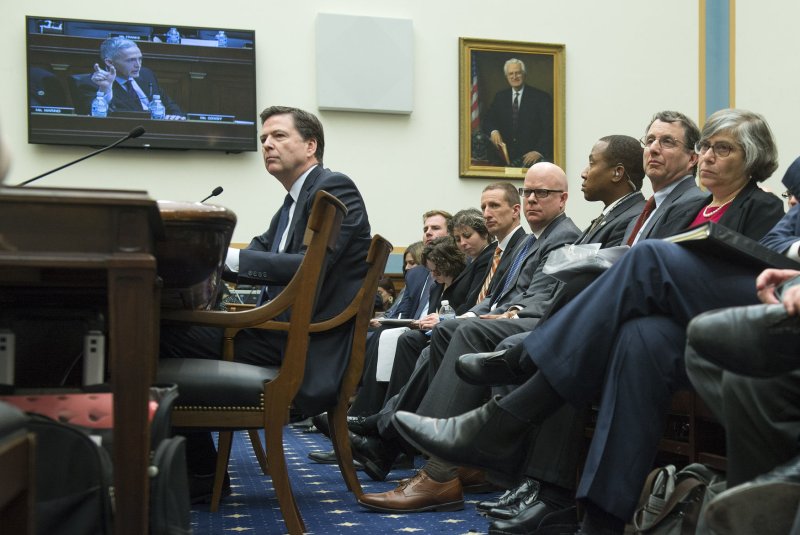1 of 3 | FBI Director James B. Comey testifies on data encryption during a House Judiciary Committee hearing titled, "The Encryption Tightrope: Balancing Americans' Security and Privacy, on Capitol Hill in Washington, D.C., on Tuesday. The hearing comes in the wake of the FBI's attempt to force Apple to unlock an encrypted iPhone belonging to a suspect in the San Bernardino shootings in December. Photo by Kevin Dietsch/UPI |
License Photo
WASHINGTON, March 1 (UPI) -- The U.S. Justice Department's fight to force iPhone maker Apple to aid them in breaking into the smartphone of one of the San Bernardino terror suspect's smartphone shifted to Capitol Hill Tuesday, where FBI Director James Comey faced hours of questioning from lawmakers.
Tuesday's hearings lasted for five hours and featured Comey as well as an Apple attorney.
Speaking first, Comey underscored the importance of the case, and predicted that similar showdowns in the future between law enforcement agencies and technology companies will have the ability to make or break the government's fight against domestic terrorism.
He warned that technology will soon make it virtually impossible for investigators to access critical personal communications from terror suspects.
"Our job is simply to tell people there is a problem," Comey testified during a two-hour appearance before the House Judiciary Committee. "Everybody should care about it, everybody should want to understand. If there are warrant-proof spaces in American life, what does that mean and what are the costs of that?"
The Justice Department is presently tying to force Apple into creating a one-off software program that will allow FBI investigator to crack the iPhone password of San Bernardino suspect Syed Farook.
Justice officials say the FBI just needs the program to disable a security feature that resets and erases the phone's contents if an incorrect password is entered too many times. Investigators are hopeful there is data on Farook's phone that will help shed light on the Dec. 2 attack and/or possibly finger others involved.
Apple, though, and other privacy advocates, have resisted -- saying the government's request poses a significant threat to consumer privacy and sets a dangerous precedent.
"Some of you might have an iPhone in your pocket right now, and if you think about it, there's probably more information stored on that iPhone than a thief could steal by breaking into your house," Apple attorney Bruce Sewell, who testified after Comey, said. "The only way we know to protect that data is through strong encryption."
Bruce Sewell, Senior Vice President and General Counsel of Apple, Inc., is sworn in before testifying on data encryption during a House Judiciary Committee hearing titled, "The Encryption Tightrope: Balancing Americans' Security and Privacy, on Capitol Hill in Washington, D.C., on Tuesday. The hearing comes in the wake of the FBI's request to Apple to unlock an encrypted iPhone belonging to a suspect in the San Bernardino shootings in December. Photo by Kevin Dietsch/UPI
Sewell also rejected the government's assertion that Apple is being uncooperative out of concern for its business interests.
"This is not a marketing issue. ... We are doing this because we think that protecting the security and the privacy of hundreds of millions of iPhone users is the right thing to do," he said.
Monday, a federal magistrate judge in New York ruled in a different, but similar case involving Apple that the company does not have to comply with government requests intended to mine data from a suspect's cellphone.
Although a different case, the decision handed Apple an important legal victory in the matter that could heavily influence the outcome of the case involving Farook. The judge in the case, James Orenstein, sided with Apple because, he said, Congress has previously rejected a bill to allow law enforcement agencies the authority to force companies into bypassing security features in behalf of investigators.
Fearing a precedent that might encourage authorities in the future to circumvent Congress in favor of a judge's ruling, Orenstein rejected the government's argument.
"It's directly on point," a senior Apple executive said of Monday's ruling. "This is the first time a court has looked specifically at the issue."
The government said it would seek an appeal in district court.
















